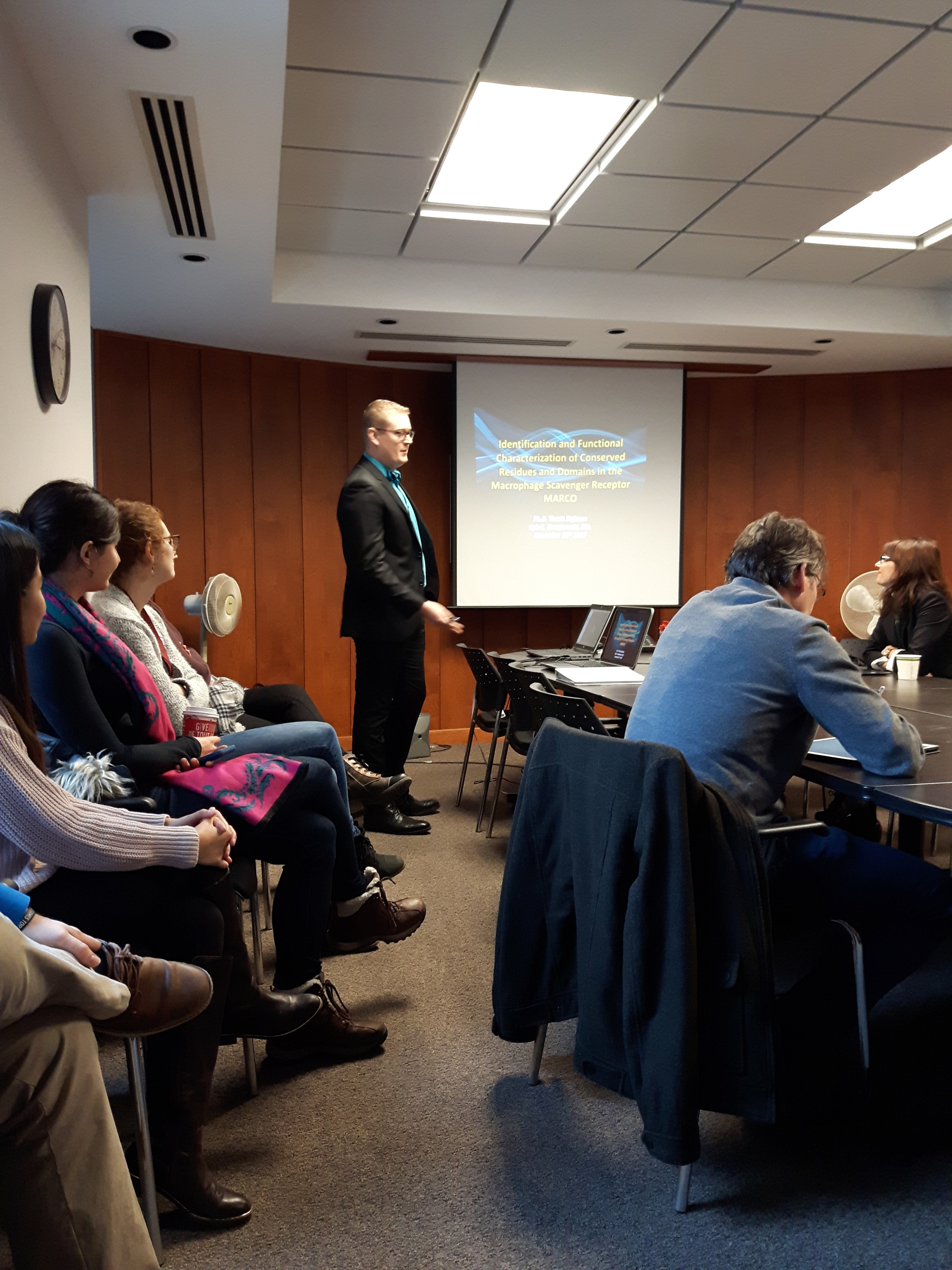Tag Archives: infectious disease
Publication: Is Lung Health Good Health For Older Adults?
November is Lung Month – what do older adults need to know about pneumonia?
Dr Bowdish is the Canadian Lung Association’s spokesperson for World Pneumonia Day (November 12, 2018). Here she discusses the importance of being vaccinated for pneumonia….
She also speaks to Zoomer Magazine about pneumonia, vaccinations and the aging immune system here…
To get a sense of the other lung research going on in the Bowdish lab, see our Instagram page: house.macrophage
>
Congrats to high school student Anika Gupta as she heads off to the international science fair!
The Bowdish lab was very proud to host Anika Gupta, a high school student, for her Bay Area Science and Engineering Fair (BASEF) project.
Her project was entitled “Quantifying Lung Macrophages to Understand Increased Susceptibility to Bacterial Pneumonia with Age.”
Anita won the Dr. Doyle Biology Award for the best Biology project, a Gold merit award as well as the Pinnacle Award for the Third Best in Fair and a sponsored Trip Award to compete in the Intel International Science and Engineering Fair in Pittsburgh, Pennsylvania in May!
Way to go Anika!
See her featured in the Hamilton news here.…
Dr. Bowdish gives a lecture for kids “Who’s got more cooties – boys or girls?”
Dr. Bowdish explains what cooties are, how the microbes that live on and in us can be friends and foes and describes how differences in infections and health between boys and girls, men and women are sometimes due to biology and sometimes due to behaviour.
Read the article summarizing the event here.
To see Dr. Bowdish put on a macrophage cape and teach the school kids the difference between a commensal, a pathobiont and a pathogen by dressing up their teachers, watch here…..
Dr. Bowdish talks to Zoomer Radio about how older adults can protect themselves from pneumonia.
It’s a very serious illness, especially for #Zoomers @libbyznaimer talks with expert @MsMacrophage Dawn Bowdish, Chair of #Aging & Immunity @McMasterU to find out everything we need to know about #Pneumonia at 12 and we take your calls as well at: 416-360-0740 or 1-866-740-4740
— Fight Back w/ Libby (@fightbacklibby) December 27, 2017
Listen to the interview here.
Kyle Novakowski is the Bowdish lab’s newest PhD!
Kyle Novakowski successfully defended his thesis “IDENTIFICATION AND FUNCTIONAL CHARACTERIZATION OF CONSERVED RESIDUES AND DOMAINS IN THE MACROPHAGE SCAVENGER RECEPTOR MARCO” to become the Bowdish lab’s 4th PhD student. He’ll be joining Turnstone Biologics as a PhD scientist. We wish him very well in his future endeavours. Congratulations Dr. Novakowski!
‘Inflamm-aging’ by seniors may impact pneumonia susceptibility
Antibiotic treatment alone may not be sufficient to treat pneumonia in older adults. In fact, it appears as though the inflammation that comes naturally with age increases the risk of developing pneumonia. “It sounds counterintuitive to limit inflammatory responses during a bacterial infection, but clinical observations and our research indicates anti-bacterial strategies need to be tailored to the age of the patient,” said MIRC’s Associate Professor Dawn Bowdish.
Aging is accompanied by a chronic state of low-level inflammation — sometimes called ‘inflamm-aging’ — which is associated with diseases such as cardiovascular disease, dementia and infections, particularly pneumonia. Upon recognition of an infectious agent, an acute inflammatory response is required to fight infection and resolves shortly after. However, in older adults, where systemic inflammation is already elevated, increases in inflammation during infection do not resolve as quickly. Exposure to these high levels of inflammation appears to impair the ability of monocytes and macrophages to fight infection.
Published today in the journal PLoS Pathogens, MIRC graduate Dr. Alicja Puchta & PhD student Avee Naidoo demonstrated that the higher levels of inflammation in the blood of old mice caused the premature egress of inflammatory monocytes into the blood stream, and contributed to greater systemic inflammation. Although small amounts of inflammation are required to fight infection, enhanced production of inflammation in old mice lead to reduced monocyte and macrophage function. Reducing levels of inflammation in the young mice had no effect but reducing levels in the old mice resulted in improved bacterial clearance and survival against S.pneumoniae.
The research follows a 2015 McMaster study that showed that older adults with pneumonia do better when given drugs, such as corticosteroids, to reduce inflammation in addition to antibiotics. “Our study in mice is consistent with clinical studies that recommend using anti-inflammatories as part of treatment to improve older adults’ defence against pneumonia, and that points to the development of better care,” said Bowdish.
To read the PLoS Pathogens article, please click here.
Publication:TNF Drives Monocyte Dysfunction with Age and Results in Impaired Anti-pneumococcal Immunity
Publication: Infection in an aging population. Curr Opin Microbiol. 2015 Dec 10;29:63-67.
0″ height=”324″ />





